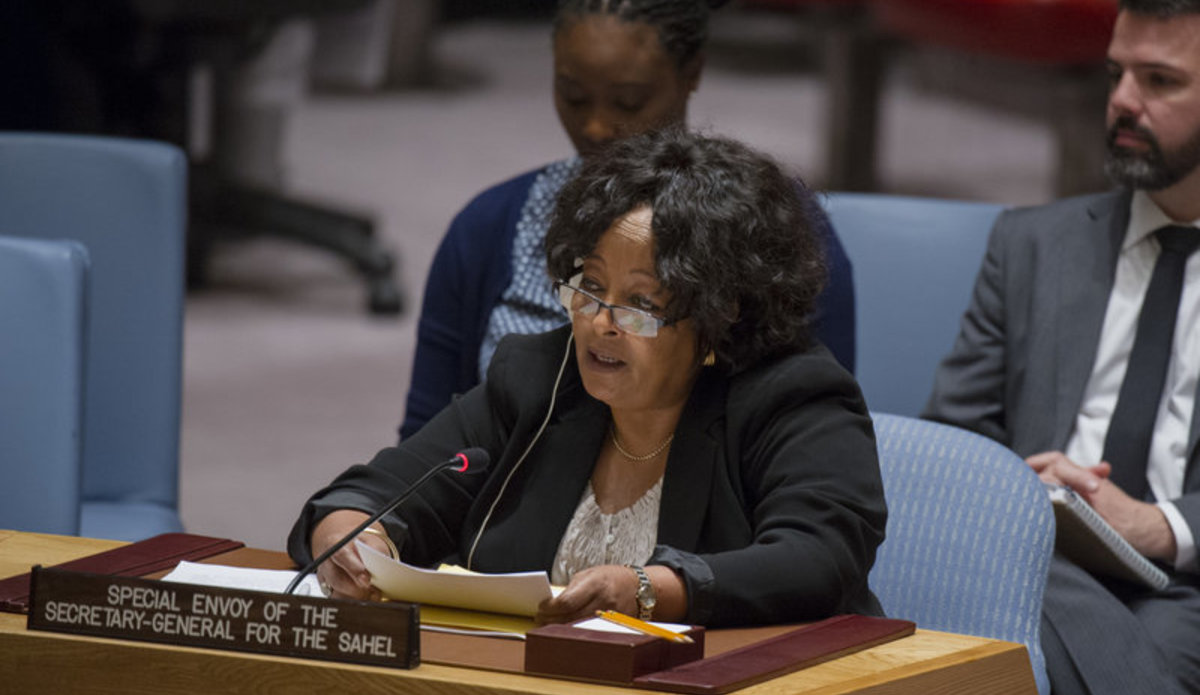Mr. President,
It is my honour to brief the Security Council for the second time on the implementation of the United Nations Integrated Strategy for the Sahel and the situation in the Sahel. It is an important opportunity to highlight the predicament of a region which desperately needs the continued focus of the Security Council.
I take the floor at a time when terrorist attacks have taken place around the world: in Bamako, Northern Cameroon, Nigeria, Paris, Lebanon and targeting a Russian aircraft over the Sinai; attacks in which too many innocent lives were lost and which I strongly condemn.
The attacks attest to the global reach of terrorism and the interconnectedness of all communities, whether rich or poor, and are a reminder to us all that no one is immune to this threat. The fight against terrorism requires international solidarity. Global partnerships in the fight against terrorism are no more an option but an imperative for survival.
Security threats continue to be the main preoccupation in the Sahel region. Increasingly, the countries of the region, who are amongst the poorest and least developed in the world, are forced to dedicate important percentages of their budgets to address security threats, in a region where only 56 percent of children have access to primary education, and only 36 percent of the population can read and write. This unsustainable vicious cycle can only worsen without a strong international assistance.
It is very alarming that youth and women in the Sahel, who constitute a vast majority of the population, are the targets of recruitment into radical movements. Up to 41 million youth under 25 years of age in Burkina Faso, Chad, Mali, Mauritania and Niger alone face hopelessness and are at risk of radicalisation or migration.
If nothing is done to improve access to education, increase employment and integration opportunities for the youth, the Sahel, I am afraid, will become a hub of mass migration, and of recruitment and training of terrorist groups and individuals, which, as you know, will ultimately have grave consequences for global peace and security.
Drug traffickers are increasingly colluding with armed groups and terrorist movements which grant them safe passage in exchange for financial benefits. If conflicts are to be prevented in the Sahel, illicit trafficking, including of drugs, weapons and humans should be stopped.
Governance challenges are persisting, with important segments of the populations, continuing to be denied meaningful political participation.
Building communities’ resilience continues to be a real challenge in the Sahel, due to the persistence of extreme environmental degradation, repeated climate shocks, and demographic trends which together are pushing millions of people on the brink of humanitarian disaster.
Mr. President,
The persistence of these challenges notwithstanding, there are reasons to be optimistic about the Sahel.
First of all, the Sahel has continued to receive the sustained attention of the international community, as evidenced by the numerous Sahel strategies. Improvements in the coordination of our efforts and strategies will enhance the benefits of these activities to Sahel communities.
Secondly, the countries of the region have taken greater leadership and ownership of initiatives addressing regional challenges in the Sahel. There is evidence of enhanced partnership and coordination between the countries of the region and international partners using various platforms established by the G5 Sahel, the African Union, the Economic Community of West African States (ECOWAS), the Economic Community of Central African States (ECCAS), and the Lake Chad Basin Commission (LCBC).
Thirdly, the United Nations entities working in the region have improved coordination and coherence in the implementation of the UN Integrated Strategy for the Sahel. My office has made ownership of projects by the countries of the region the hallmark of its regional programming by ensuring full consultations and effective operational partnerships with regional organisations, governments, civil society and beneficiary communities.
We have, in an innovative manner, worked closely with several United Nations agencies, funds and programmes which are now jointly developing and implementing projects aimed at addressing multi-dimensional issues in the areas of governance, security and resilience. In that regard, significant progress has been made in the development of regional projects by United Nations entities and the International Organisation for Migration, in collaboration with regional organisations and countries of the region.
I recognise the central responsibility of the Sahel countries to take the lead in finding solutions to the challenges they face. I am, however, also obliged to admit that the Sahel is a victim of the effects of global phenomena such as climate change, drug trafficking, violent extremism and the global economic decline which surpass the nations’ capacity to address them, and which require diverse tools to mitigate and prevent these trends.
Mr. President,
As I conclude, I would like to make two recommendations:
First, I would urge the Security Council to remain engaged in support of the Sahel region.
Second, I would urge the Security Council to fully use existing mechanisms to better monitor, report on and prevent the trafficking of weapons, drugs and persons in the Sahel region. This trade finances terror and instability, and must be choked if our efforts are to be successful. I would also like to highlight the importance of listing all those who indirectly finance or support terrorist activities in the Sahel. In that regard, I commend the efforts of the Security Council Committee established pursuant to resolution 1267 and 1989 concerning Al-Qaida and associated individuals and entities, which has so far listed seven (7) entities and six (6) individuals who have their origins in the Sahel region.
Finally, I encourage the international community to enhance its support to the United Nations and regional organizations in addressing cross cutting and trans-boundary issues. Together, we can prevent further deterioration of the situation in the Sahel.
I thank you for your kind attention.

